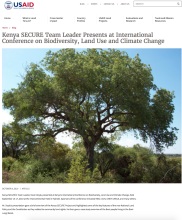Land Library
Bienvenue dans la bibliothèque du Land Portal. Explorez notre vaste collection de ressources en libre accès (plus de 74 000), comprenant des rapports, des articles scientifiques, des articles de recherche, des publications évaluées par des pairs, des documents juridiques, des vidéos et bien plus encore.
/ library resources
Showing items 1 through 8 of 8.The USAID's Investor Survey on Land Rights aimed to provide a more systematic understanding of the drivers of tenure risk to land-based investments from the perspective of the private sector, and of how investors and operators assess, mitigate and are affected by such risks.
The ways in which people obtain land in Uganda are changing fast. Land that used to be secured through inheritance, gifts or proof of long-term occupancy is now more commonly changing hands in the market.
This guide discusses USAID’s recommendations for best practices related to the due diligence and structuring of land-based investments, with the goal of reducing risks and facilitating responsible projects that benefit both the private sector and local communities.
Guest commentary by Robert Oberndorf, Resource Law Specialist, Tenure and Global Climate Change Project.
A guest post by Robert Oberndorf, Resource Law Specialist, Tenure and Global Climate Change Project. Recent rapid changes in Burma have led to concerns related to the land tenure and property rights (LTPR) of smallholder farmers and communities throughout the country.
Property rights are inexorably linked to taxes, largely because property taxes are often one of the easiest taxes to collect, particularly in developing markets with significant informal sectors.
Kenya SECURE’s Team Leader, Kevin Doyle, presented at Kenya’s International Conference on Biodiversity, Land Use and Climate Change, held September 15-17, 2010 at the Intercontinental Hotel in Nairobi. Sponsors of the conference included KWS, IUCN, UNEP, EAWLS, and many others.
In this oil research paper, we have set out the challenges confronting oil producing countries in sub-Saharan Africa by giving case studies of Nigeria, Angola and Equatorial Guinea. We have also critiqued the draft National Oil and Gas Policy under formulation as well as the legal framework.






